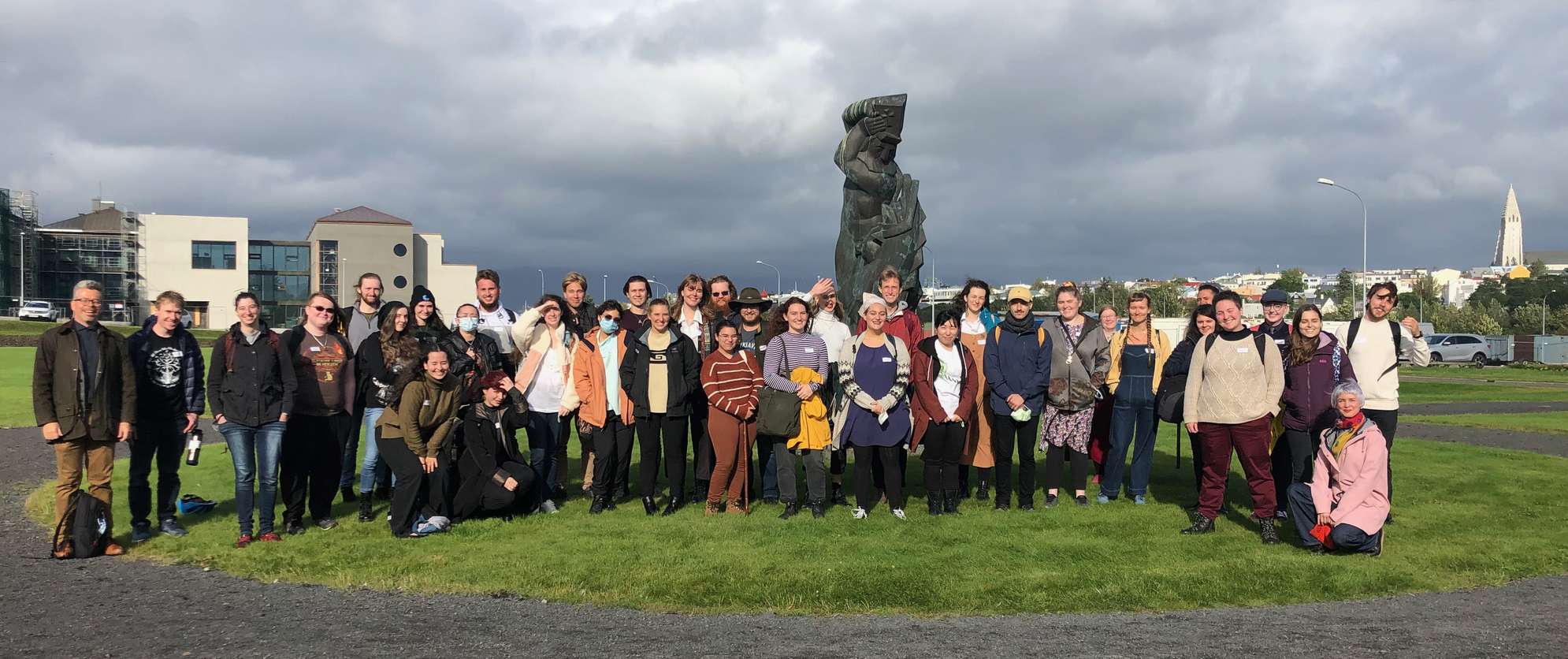MIS Graduate Students 2021-2022

Medieval Icelandic Studies & Viking and Medival Norse Studies orientation meeting August 27, 2021. — See also our graduate students in Viking and Medieval Norse Studies.

Medieval Icelandic Studies & Viking and Medival Norse Studies orientation meeting August 27, 2021. — See also our graduate students in Viking and Medieval Norse Studies.
Specimens of minerals known as zeolites, collected in Breiðdalur in the East Fjords, play a key role in a new discovery by a team of scientists in the US and Iceland. The researchers believe that these minerals could be used to quantify long-term temperature changes. Among the researchers is Tobias Björn Weisenberger, geoscientist and director of the new UI Research Centre in Breiðdalsvík. The findings have been published in Communications Earth and Environment, a new open access journal established by Nature Portfolio.
Dr. Daulaire will discuss the key achievements and failures of these efforts over the past half-century, with a special focus on the COVID 19 pandemic. With the toll of the global COVID 19 pandemic approaching 3 million deaths in 192 countries and new and dangerous variants emerging constantly, the need for concerted global action has never been greater. This calls for not only a thoughtful public health approach but also diplomacy to bring coherence from the range of disparate and self-interested national responses.
The UArctic Congress 2021 will take place May 15-18, primarily online with limited local participation in Reykjavik, Iceland. The event is hosted by all UArctic higher education members in Iceland. There will be a live stream of the opening ceremony on 15 May at 1 PM.
The UArctic Congress aim is to bring together institutional leaders, indigenous representatives, academics, scientists and students from around the Circumpolar North and beyond to engage with each other and promote cooperation in circumpolar science and higher education. Together with partners, policy makers and other actors, the UArctic Congress strives to take the Arctic agenda forward by creating and strengthening collaborations that produce new findings and solutions for the future of the Arctic.
Before considering doctoral studies, applicants must have determined their field of interest. Applicants often find a research project and a supervisor after discussing with teachers, scientists or experts at the University of Iceland or other institutions. If the project in led by an expert outside of UI, a tutor within the university must be appointed. Master's study research projects sometimes also extend into doctoral projects. When scientists receive grants for specific research projects they often advertise for doctoral students' participation.
When applying for our doctoral program you must have an agreement with a supervisor. You can search for a specialist at UI here.
Sprotamýri is the Entrepreneurship Centre of the University of Iceland, where students and staff can get facilities and assistance from support entities such as KLAK - Icelandic Startups and the Science Park while working on their innovative ideas, free of charge. Sprotamýri has 12 tables in an open workspace that are allocated three times a year, for the spring semester, autumn semester and during the summer. Sprotamýri, is located in Mýrin - the innovation center of the University of Iceland Science Parks in Gróska.
The free facilities and assistance are open for applications. The application form can be found here. The deadline for the summer semester is September 15th, 2024.
Lupins are extremely prevalent here in Iceland, yet remain a little utilised resource. In other countries, the lupin has been used as food for humans and animals, since it is rich in protein and energy as well as starch. It is considered particularly good for ruminants, as well as pigs and birds. The Icelandic lupin is more bitter than foreign, sweeter varieties and animals have therefore rejected it.
The goal of the research, conducted this summer in cooperation with the Student Innovation Fund, is to find uses for the Icelandic lupin, both in human food and animal feed for farming. The project is an extension of Braga Stefaný Mileris' doctoral thesis. Braga Stefaný started work on a basic analysis of the contents of different parts of the lupin in autumn 2019.
Just over half of those who were infected with COVID-19 during the first wave of the epidemic this spring believe that their health is now worse than it was before. This is according to the findings of an extensive research project by academics in the field of nursing at the University of Iceland and Landspítali University Hospital.
BMC Seminar Thursday 29 October, 12:00
Speaker: Magnús K. Magnússon, professor, Faculty of Medicine, University of Iceland and project leader deCODE GEnetics
Susan Rafik Hama
Will defend her doctoral thesis in educational sciences at the Faculty of education and diversity University of Iceland
Experiences and expectations of successful immigrant and refugee students while in upper secondary schools in Iceland
The defence will take place 25th November at 9
the defence will be broadcasted at this link: https://livestream.com/hi/doktorsvornsusanrafikhama
Opponents are: Dr. Ghazala Bhatti, Professor at Bath Spa University, England, and Dr. Unnur Dís Skaptadóttir, Professor at University of Iceland
The doctoral committe: Dr. Hanna Ragnarsdóttir lead supervisor, Dr. Börkur Hansen, co supervisor both Professors at University of Icelandand, a specialist Dr. Thor-André Skrefsrud, Professor at Inland Norway University of Applied Sciences, Noregi.